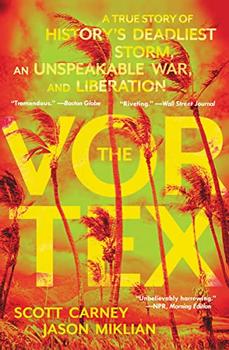Summary | Excerpt | Reviews | Beyond the Book | Readalikes | Genres & Themes | Author Bio

A True Story of History's Deadliest Storm, an Unspeakable War, and Liberation
by Scott Carney , Jason Miklian
Pakistan gained independence but emerged a divided nation, figuratively and literally. The two sides of the new country were supposed to find common cause in religion, but without a shared culture or language, the connection felt hollow. The New York Times described the divisions in broad terms: "It is hard to imagine two races or regions any more different. They speak different languages—Urdu in the West, Bengali in the East—eat different foods—meat and grain in the West, fish and rice in the East—and have almost contradictory cultures, for the Bengalis are volatile and love politics and literature while the Punjabis are more stolid and prefer governing and soldiering."
It didn't help that Pakistan's leaders used the old British governing system as a blueprint for how to deal with their eastern wing a thousand miles away. They treated it like a colony, shipping in thousands of police and administrators and shipping out literal boatloads of cash and goods like tea, jute, and oil, courtesy of the east's rich resources.
The student under the banyan tree, with his partially grown facial hair and elegant shirt, echoed a sentiment that resonated with most Bengalis: A unified Pakistan was a farce. The British and the Hindus had given Pakistan's leaders all the tools they needed to make Bengalis their vassals, and West Pakistan used those tools with gusto, curtailing Bengali culture and language at every available turn. After all, there was no B in the acronym of Pakistan.
But recognizing problems and actually fixing them were two very different things. Hafiz had seen his father tilt at the same windmills for decades and what had it ever gotten him? Every few years, the cycle repeated itself: The agitators would get angry that nothing was changing and would riot. The army showed up to put down the unrest. Activists would either go to jail or be killed, and the survivors would go free. Eventually the whole thing would start all over again.
Hafiz walked around the corner to his favorite spot on campus, Madhur Café—the perfect place for a postgame snack. Although it was only a one-minute walk from the protest, he figured that it wouldn't get crowded until after the students grew tired of chanting.
The place was empty when Hafiz walked in. Only the canteen manager, Madhusudan Dey, stood at the heavy wooden counter. He wore a white, buttoned-up kurta and had a mark on his forehead for a Hindu festival of some sort—Hafiz never could keep track of them all. Dey was bent over a neat ledger, accounting for every flaky roti, singara (a savory stuffed potato pastry), and sugary cup of milk tea that students had promised to one day repay. Dey looked up and brandished a wide, warm smile when he saw Hafiz.
"At last, someone who can pay for his own meals!" said Dey, greeting the star. Dey shook his head in mock despair at the vast sums of debt the rest of the student body had managed to rack up.
Dey's food was pretty much the only thing that Hafiz liked about the university, and Dey appreciated that Hafiz's 5,000-rupee-a-year salary as a sporting icon was more than enough to pay for his prodigious appetite. Yet Hafiz knew that Dey wasn't too worried about the deadbeats either. After all, Dacca University was the Oxford of East Pakistan. Dey saw how, time and again, even the brokest Dacca U students would go on to become business moguls, lawyers, politicians, or societal elites, so he extended liberal credit to every student. People all around Dacca had stories about the old canteen manager showing up at their office a decade after they had graduated with a bill for four years of tea and singaras in hand. Almost all of them had such fond memories of the man that they paid him back with interest. Hafiz couldn't help but like Dey.
A few minutes later, the major strolled through the door, exactly on time. He'd changed into a more formal uniform, complete with a beret. Hafiz noticed an uncharacteristic bounce in the man's step.
Excerpted from The Vortex by Scott Carney and Jason Miklian. Copyright © 2022 by Scott Carney and Jason Miklian. Excerpted by permission of Ecco. All rights reserved. No part of this excerpt may be reproduced or reprinted without permission in writing from the publisher.
Your guide toexceptional books
BookBrowse seeks out and recommends the best in contemporary fiction and nonfiction—books that not only engage and entertain but also deepen our understanding of ourselves and the world around us.